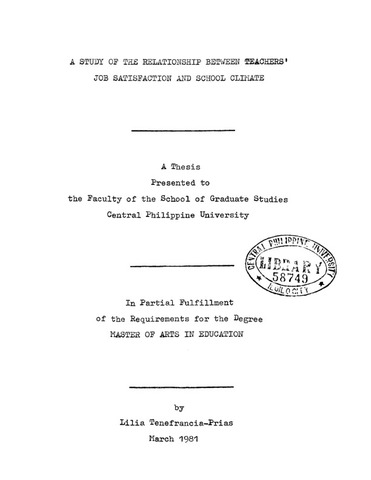Показать сокращенную информацию
A study of the relationship between teachers' job satisfaction and school climate
| dc.contributor.adviser | Ruiz, Macario B. | |
| dc.contributor.author | Prias, Lilia Tenefrancia | |
| dc.date.accessioned | 2021-10-04T02:48:20Z | |
| dc.date.available | 2021-10-04T02:48:20Z | |
| dc.date.issued | 1981 | |
| dc.identifier.citation | Prias, L. F. (1981). A study of the relationship between teachers' job satisfaction and school climate (Unpublished Master’s thesis). Central Philippine University, Jaro, Iloilo City. | en_US |
| dc.identifier.uri | https://hdl.handle.net/20.500.12852/1471 | |
| dc.description | Introduction and statement of the problem | en_US |
| dc.description.abstract | Statement of the Problem The main purpose of this research was to find out the relationship between teachers' job satisfaction and school climate as assessed by students. More specifically, it sought to answer the following questions: 1. To what extent are the teachers satisfied with their jobs as determined in terms of the following factors of job satisfaction: (a) mental and physical exertion, (b) relations with associates or peers, (c) relations with superiors, (d) job security, advancement, and financial considerations, (e) interest and emotional involvement, (f) job status and job information, (g) physical surroundings and work conditions, (h) future and progress towards goals, and lastly, (i) past achievement and accomplishment? 2. What are the perceptions of students of their school climate in terms of (a) achievement orientation, (b) orderliness, (c) supportiveness, and (d) welfare- social orientation when schools are grouped according to size of enrolment? 3. Is there relationship between teachers' job satisfaction and each of the four dimensions of school climate as assessed by students? 4. Is there relationship between teachers' job satisfaction and the size of schools? The concept of job satisfaction has always posed a challenge to management in any work organization. This is so because of its relevance to the attainment of organizational goals. If education must perform its role effectively, the teachers, the primary change agents, must be given the proper attention they deserve. The extent of their job satisfaction is dependent on how the various factors of the job are met. Usually teachers grow in unity and effectiveness as they find satisfaction of their needs. | en_US |
| dc.format.extent | 185 leaves | en_US |
| dc.language.iso | en | en_US |
| dc.subject.ddc | GSL Theses 378.242 P93 | en_US |
| dc.subject.lcsh | Teachers | en_US |
| dc.subject.lcsh | Job satisfaction | en_US |
| dc.subject.lcsh | Teachers--Job satisfaction | en_US |
| dc.subject.lcsh | Organizational behavior | en_US |
| dc.subject.lcsh | Work environment | en_US |
| dc.subject.lcsh | Teachers--Job satisfaction--Evaluation | en_US |
| dc.subject.lcsh | Organizational behavior--Evaluation | en_US |
| dc.title | A study of the relationship between teachers' job satisfaction and school climate | en_US |
| dc.type | Thesis | en_US |
| dc.description.bibliographicalreferences | Includes bibliographical references | en_US |
| dc.contributor.chair | Herradura, Elma S. | |
| dc.contributor.committeemember | Griño, Eliza U. | |
| dc.contributor.committeemember | Porter, Josefina Y. | |
| dc.contributor.department | School of Graduate Studies | en_US |
| dc.description.degree | Master of Arts in Education | en_US |
| local.subject | Organizational climate | en_US |
| local.relation.associatedcontent | https://repository.cpu.edu.ph/handle/20.500.12852/2608 Journal article published in Southeast Asia Journal | en |


